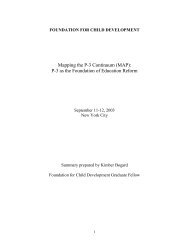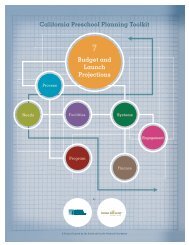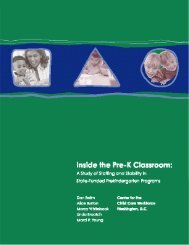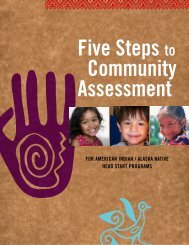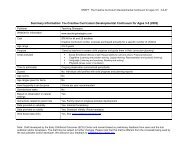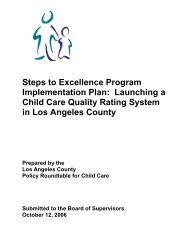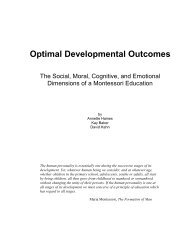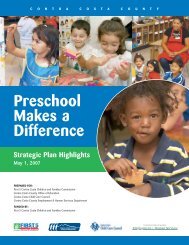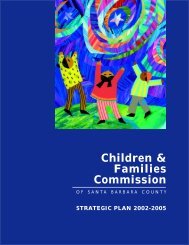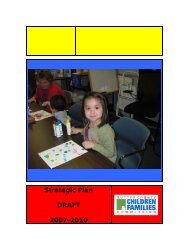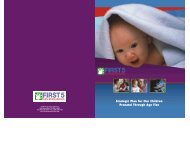Download this file - Plan4Preschool
Download this file - Plan4Preschool
Download this file - Plan4Preschool
You also want an ePaper? Increase the reach of your titles
YUMPU automatically turns print PDFs into web optimized ePapers that Google loves.
For more information regarding accountability report cards, contact the Evaluation,<br />
Research and Analysis Unit, at (916) 319-0875 or by e-mail at evaluation@cde.ca.gov.<br />
Additional information is also available on the State Accountability Report Card Web site<br />
at http://www.cde.ca.gov/ta/ac/sc/index.asp.<br />
For More Information Regarding NCLB<br />
For more information regarding California’s NCLB activities, visit the NCLB Web site at<br />
http://www.cde.ca.gov/nclb. The U.S. Department of Education also has an NCLB Web<br />
site at http://www.nclb.gov.<br />
For more information regarding NCLB requirements for AYP, contact the CDE’s<br />
Evaluation, Research and Analysis Unit, at (916) 319-0875 or by e-mail at<br />
evaluation@cde.ca.gov.<br />
For more information regarding AYP reports, contact the CDE’s Academic<br />
Accountability Unit (AAU), at (916) 319-0863 or by e-mail at aau@cde.ca.gov.<br />
Title I<br />
As the largest federal program supporting elementary and secondary education, Title I<br />
of the NCLB Act is intended to help ensure that all children have the opportunity to<br />
obtain a high-quality education and to reach proficiency on challenging state academic<br />
standards and assessments. Title I provides flexible funding that may be used to<br />
provide additional instructional staff, professional development, extended-time<br />
programs, and other strategies for raising student achievement in high-poverty schools.<br />
The following information describes some of these programs. Other Title I programs are<br />
included in the Family Involvement and English Learners sections.<br />
Education of Migratory Children<br />
The Migrant, Indian, and International Education Office plans, implements, and<br />
evaluates programs and projects that support the education of migrant students and<br />
their families. The purpose is to ensure that migratory students have the opportunity to<br />
meet the same challenging state content and performance standards that all children<br />
are expected to meet. The program is supported by federal and state laws. Programs<br />
include the following:<br />
• Binational Education: Implements an international program between Mexico and<br />
the United States<br />
• Mini-Corps: Provides tutoring to migratory students<br />
• Portable Assisted Study Sequence (PASS): Provides academic course work for<br />
high school students to make up credit deficiencies<br />
• Migrant State Parent Advisory Council: Provides support for Migrant Education<br />
62



